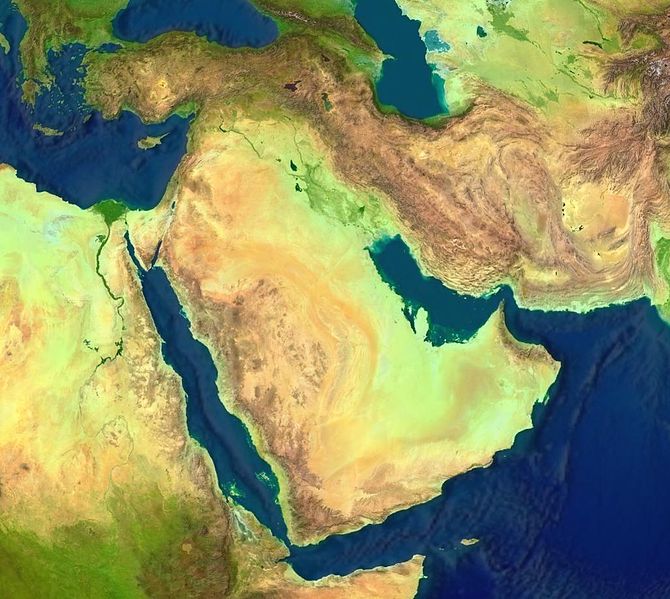Do Obama and Romney Even Know What Foreign Policy Is?
 Foreign policy is not a game. It is not a contest, it is not a place to show off, and it must transcend mere politics. It is easy to draw red lines for Iran; it is hard to make Iran abide by them. It is easy to criticize China’s corrupt trade policies; it is hard to make China follow American rules. It is easy to condemn human rights abusers worldwide; it is hard to bring them to justice. It is easy to criticize security failures; it is hard to guarantee consistent success. It is easy to debate foreign policy; it is hard to actually have a foreign policy.
Foreign policy is not a game. It is not a contest, it is not a place to show off, and it must transcend mere politics. It is easy to draw red lines for Iran; it is hard to make Iran abide by them. It is easy to criticize China’s corrupt trade policies; it is hard to make China follow American rules. It is easy to condemn human rights abusers worldwide; it is hard to bring them to justice. It is easy to criticize security failures; it is hard to guarantee consistent success. It is easy to debate foreign policy; it is hard to actually have a foreign policy.
President Obama continues to cite specific successes without doing the hard thing and articulating a fuller narrative. Mr. Romney continues to criticize the President’s “apologetic” foreign policy, without articulating an actionable alternative. The president must realize that the success in toppling Qaddafi means nothing to the people dying today in Syria. Mr. Romney needs to learn that “killing the bad guys” is not a real-world strategy.
That it is two weeks to Election Day and neither candidate has yet to advance a concrete, realistic foreign policy agenda is perhaps expected, but it is unacceptable. The global stakes, as Romney has repeatedly pointed out, are too high for this. And, debate performance none withstanding, both Obama and Romney are egregiously at fault here.
In assessing both candidates’ foreign policies, the rational Republican and levelheaded Democrat must recognize some of President Obama’s successes. Intervening in Libya was good. Taking out bin Laden was very good (although boring, by now.) Sanctioning Iran, although acutely harmful to the Iranian people, is undoubtedly the strongest, sanest way to deter Iran from pursuing its worrisome nuclear agenda, and Obama has never wavered with this. Leaving Iraq and Afghanistan is the timely thing to do. There have, undeniably, been numerous high points in Obama’s foreign policy, and if we are to blame Obama for his failings, we must be fair and also praise him for his successes.
The same rational Republican and levelheaded Democrat must also see through the fallacy of many of Romney’s chief ideas. No president should antagonize China and Russia when both countries will not only refuse to listen but will worsen their relations with the U.S. in response; no president should throw around dangerously volatile rhetoric towards Iran just because of a particularly strong affinity for Israel; and no president, finally, should consistently utter soaring rhetoric about America’s God-given role to save the world when no one past our shores believes one word of it. American exceptionalism is a beautiful thing—Americans live by it, and it’s sometimes been true. But it often hasn’t.
And yet, hidden under all this empirically meaningless rhetoric, Romney gets one point remarkably right. While President Obama succeeded in Libya, he failed in Iran in 2009. While Obama ultimately made the right call towards Egypt, he’s failing the Syrian people today. To be sure, there was reason for Obama to stay silent during the 2009 Iranian uprisings—because there was nothing he could have actually done to change anything on the ground. So too, is there wisdom in the argument that throwing weapons into Syria will not make things better—although, I’d argue that the time for that fear has come and gone months ago.
But the problem, which Romney should be hitting on harder, is that this pattern of inaction and action does not represent a plan; it does not represent—what’s the word—a foreign policy. A policy must be endurable, it must be flexible, and it must be overarching. Obama shies away from the overarching, but this is no excuse. Even a pragmatist has criteria. Obama seems to have none, leaving all his individual accomplishments seeming somewhat hollow in the lack of some clear view of what America’s foreign policy should be.
I critique, you might say, without offering an actual solution. So let’s try to piece such a solution together. America’s foreign policy should, firstly, recognize its own limits, especially during a time where much of the anti-American world is coming into its own. But this foreign policy should maintain guidelines on action and inaction that signal to the world where America stands in relation to the Arab Spring, while maintaining flexibility in terms of providing different kinds of aid to different troubled countries. This foreign policy should prevent Iran from acquiring a nuclear weapon, without shouting about it so loudly. It should emphasize the importance of Israeli-Palestinian peace talks and act as a real mediator. It should highlight America’s commitment to the sustainability of the Eurozone. And finally, it should talk about freedom only when we actually plan to do something about it.
This is simplistic, of course. But it is so obviously necessary in a way that both campaigns have seemingly failed to grasp. For those dying daily in Syria, all of our talk of bringing freedom to the world is illusory. The rhetoric only works if we act exceptionally, and right now America has a long way to climb.
